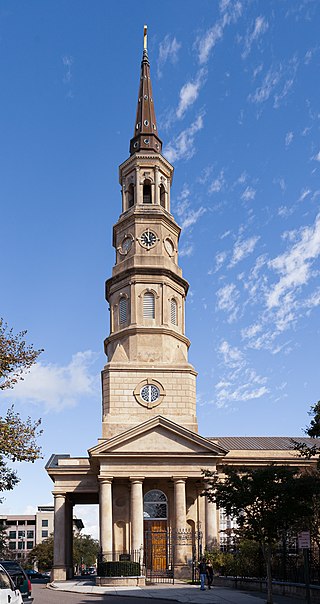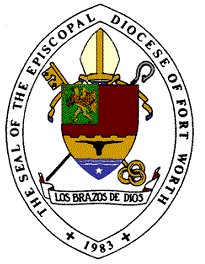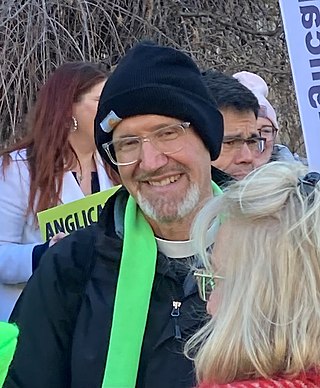Related Research Articles
The Anglican Church of Mexico, originally known as Church of Jesus is the Anglican province in Mexico and includes five dioceses. The primate is Enrique Treviño Cruz, Bishop of Cuernavaca, while Julio César Martín-Trejo, Ricardo Joel Gomez Osnaya, Óscar Pulido, and Alba S. Hernández, are the other bishops of the Church. Although Mexican in origin and not the result of any foreign missionary effort, the Church uses the colors representing Mexico as well as those of the United States-based Episcopal Church in its heraldic insignia or shield, recognizing a historical connection with that US church which began with obtaining the apostolic succession.

The Episcopal Diocese of Tennessee is the diocese of the Episcopal Church in the United States of America that covers roughly Middle Tennessee. A single diocese spanned the entire state until 1982, when the Episcopal Diocese of West Tennessee was created; the Diocese of Tennessee was again split in 1985 when the Episcopal Diocese of East Tennessee was formed. It is headquartered in Nashville, Tennessee.

The Anglican Diocese of South Carolina (ADOSC) is a diocese of the Anglican Church in North America (ACNA). The diocese covers an area of 24 counties in the eastern part of the state of South Carolina. In 2019, it had 18,195 baptized members and 47 parishes. The see city is Charleston, home to the Cathedral of St. Luke and St. Paul.

The Episcopal Diocese of Pittsburgh is a diocese in the Episcopal Church in the United States of America. Geographically, it encompasses 11 counties in Western Pennsylvania. It was formed in 1865 by dividing the Episcopal Diocese of Pennsylvania. The diocesan cathedral is Trinity Cathedral in downtown Pittsburgh. The Rt. Rev. Ketlen A. Solak was consecrated and seated as its current bishop in autumn 2021.

The Episcopal Diocese of the Virgin Islands is a diocese of the Episcopal Church in the United States of America (ECUSA) which includes both the United States Virgin Islands and the British Virgin Islands. The diocese is a part of Province II of the Episcopal Church. The previous Diocesan Bishop of the Virgin Islands is the Edward Ambrose Gumbs. The sea is currently vacant. The cathedral church of the diocese is the Cathedral Church of All Saints, Charlotte Amalie. The diocese currently comprises 14 churches. There is a functioning parish school on St. Thomas All Saints Cathedral School there was an academic campus on St. Croix, St. Dunstan's Episcopal High School. St. Dunstan's closed in the 1990s. There is also the St. Georges School located on the parish property of St. Georges Episcopal Church in Road Town, Tortola in the British Virgin Islands, which also opened the St. Georges School in Palestina Estate near to the St. Paul's Episcopal Church in Sea Cow's Bay, Tortola in the British Virgin Islands. There is also the St. Mary's School located on the parish property of the St. Mary's Episcopal Church in Valley, Virgin Gorda in the British Virgin Islands.

St. Philip's Church is an historic church at 142 Church Street in Charleston, South Carolina. Its National Historic Landmark description states: "Built in 1836, this stuccoed brick church features an imposing tower designed in the Wren-Gibbs tradition. Three Tuscan pedimented porticoes contribute to this design to make a building of the highest quality and sophistication." On November 7, 1973, it was added to the National Register of Historic Places and designated a National Historic Landmark.

The Episcopal Diocese of Fort Worth is a diocese of the Anglican Church in North America. The diocese comprises 56 congregations and its headquarters are in Fort Worth, Texas.

The Episcopal Diocese of South Carolina (EDOSC), known as The Episcopal Church in South Carolina from January 2013 until September 2019, is a diocese of the Episcopal Church. The diocese covers an area of 24 counties in the eastern part of the U.S. state of South Carolina. The see city is Charleston, home to Grace Church Cathedral and the diocesan headquarters. The western portion of the state forms the Episcopal Diocese of Upper South Carolina. As a diocese of the Episcopal Church, the Diocese of South Carolina is part of the worldwide Anglican Communion and traces its heritage to the beginnings of Christianity.

Dorsey Winter Marsden McConnell is a retired American Anglican bishop. He became bishop diocesan in the Episcopal Diocese of Pittsburgh after the Rt. Rev. Robert Duncan was deposed for abandoning communion with the Episcopal Church as part of the Anglican realignment of disaffected theological conservatives in 2008.
Charles Gray Temple was eleventh bishop of the Episcopal Diocese of South Carolina, serving from 1961 to 1982.
The Episcopal Diocese of South Carolina was established in 1785 as one of the nine original dioceses of the Episcopal Church in the United States. The diocese originally covered the entire state of South Carolina, but the western part of the state became the Episcopal Diocese of Upper South Carolina in 1922. In 2012, a controversy led to the existence of two rival dioceses, the Anglican Diocese of South Carolina and the Episcopal Diocese of South Carolina, each claiming to be the legitimate successor of the original diocese.
John Clark Buchanan was an American bishop. He was the sixth bishop of the Episcopal Diocese of West Missouri.
Charles F. "Chip" Edgar III is an American Anglican bishop. He has been bishop of the Anglican Diocese of South Carolina (ADOSC) since 2022.

Christopher S. Warner is an American Anglican bishop. He is the second bishop of the Anglican Diocese of the Mid-Atlantic (DOMA), prior to which he served as a priest in the Anglican Diocese of South Carolina.
Ryan Spencer Reed is an American Anglican bishop. Since 2020, he has been the fourth diocesan bishop of the Episcopal Diocese of Fort Worth in the Anglican Church in North America.
David C. Bryan is an American bishop of the Anglican Church in North America. Consecrated to serve in PEARUSA, the Anglican Church of Rwanda's missionary district in North America, Bryan has since 2016 been bishop suffragan and area bishop for South Carolina in the Diocese of the Carolinas.
Thomas William "T. J." Johnston Jr. is an American lawyer and bishop of the Anglican Church in North America. As the first Episcopal priest whose orders were transferred to the Anglican Church of Rwanda in the 1990s, Johnston was a key figure in the Anglican realignment in the United States. Consecrated as a bishop in 2001 to serve in the Anglican Mission in the Americas, Johnston later became a church planter in South Carolina.
Trevor Walters is a British-born Canadian bishop of the Anglican Church in North America. From 2009 to 2021, he was suffragan bishop with responsibility for western Canada in the Anglican Network in Canada. As a priest in the Diocese of New Westminster in the early 2000s, Walters played a major role in the Anglican realignment in Canada.

St. Andrew's Church is a multisite Anglican congregation in Mount Pleasant, North Charleston, and Charleston, South Carolina. First established in 1835, its 1857 building is a contributing property to the Mount Pleasant Historic District. The church holds services at two other locations: downtown Charleston and North Charleston.
References
- ↑ Ruth Woodliff-Stanley elected 15th bishop of South Carolina, Episcopal News Service, 2021-05-03, retrieved 2021-10-02
- ↑ Hanley, Charles (October 2021), Episcopal Diocese to ordain first woman as Bishop in South Carolina, Charleston: WCIV (published 2021-10-01), retrieved 2021-10-02
- 1 2 Gryboski, Michael (26 September 2022). "Anglicans, Episcopal Church reach settlement on yearslong $500 million property dispute". Christian Post. Archived from the original on 27 September 2022. Retrieved 27 September 2022.
- ↑ Rademaker, Melissa (21 April 2022). "SC Supreme Court returns 14 congregations to the Episcopal Church after lawsuit". Live 5 News. Archived from the original on 31 August 2022. Retrieved 27 September 2022.
- ↑ "South Carolina Supreme Court reversal blocks transfer of 6 churches to Episcopal diocese". Episcopal News Service. 19 August 2022. Archived from the original on 11 September 2022. Retrieved 27 September 2022.
- ↑ Woodliff-Stanley, Ruth (5 November 2022). "A Word From Bishop Ruth Woodliff-Stanley About St. Matthew's, Fort Motte". Anglican Ink. Retrieved 7 November 2022.
- ↑ Dennis, Rickey Ciapha (22 April 2022). "SC bishops discuss 'new season' after high court splits breakaway church properties". The Post and Courier. Archived from the original on 20 August 2022. Retrieved 27 September 2022.
- 1 2 "Details of South Carolina settlement announced". Anglican Ink. 29 September 2022. Retrieved 7 November 2022.
- ↑ "Ruth Woodliff-Stanley ‘91 elected Bishop of South Carolina", Berkley Divinity School, May 3, 2021. Retrieved on April 5, 2022.
- ↑ "Our Team - Governance". Stanley Center for Peace and Security. Retrieved October 10, 2021.
- ↑ Tabachnik, Sam (January 16, 2020). "ACLU of Colorado leader announces plans to leave organization in March". denverpost.com. The Denver Post. Retrieved October 10, 2021.
- ↑ McDonald, Alexandra Varney (July 31, 2017). "Leaving no one out: Unitarian Universalist minister who heads Colorado ACLU..." uuworld.org. Unitarian Universalist Association. Retrieved October 10, 2021.